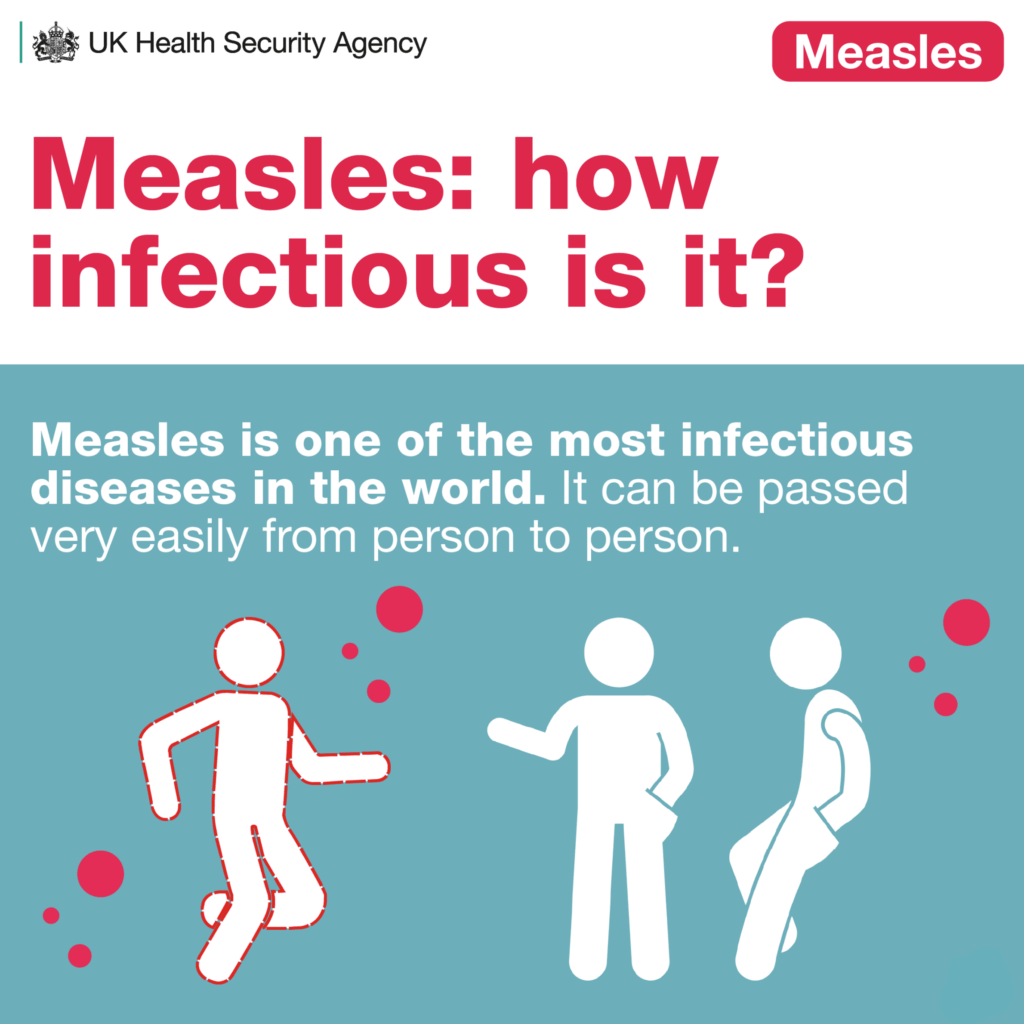
Due to the introduction of a varicella (chickenpox) vaccination programme, the measles, mumps, rubella and varicella (MMRV) vaccine replaced the MMR vaccine in the routine childhood programme on the 1 January 2026. Read about the MMRV here.
More than 1 in 10 eligible children under the age of 5 in England haven’t had the Measles Mumps and Rubella (MMR) vaccine or are only partially vaccinated.
This leaves these children unprotected and increases the risk of measles outbreaks occurring in nurseries and schools. We are reminding parents and guardians to ensure their children are protected by taking up 2 doses of the MMR vaccine at the right time.
Over the past decade, there has been a slow decline in the number of parents and carers getting their children vaccinated with the MMR and other childhood vaccines. Measles is highly contagious so even a small decline in MMR uptake can lead to a rise in cases.
In 2024 there were 2,911 laboratory confirmed measles cases in England, the highest number of cases recorded annually since 2012. Most of these cases were in unvaccinated children under the age of 10. We have also seen a resurgence of measles in Europe after the COVID-19 pandemic. As families prepare for travel over the summer break, there is more chance for measles to be brought in from countries where there are outbreaks. Catching up children who missed out on their MMR vaccines is a priority, in order to help prevent another rise in measles cases.

Vaccinations remain the best defence against infection, so it is very important that children attend their routine vaccination appointments and catch up on any they may have missed. You can see the NHS vaccination schedule here.
Measles symptoms and complications
Measles is caused by a virus and spreads very easily, it used to be common in childhood but is now rare due to the MMR vaccination programme.
When you catch it, at first it can feel like you have a cold with a runny nose and a cough, sore red eyes (conjunctivitis) and a fever, but this is followed a few days later by a rash that spreads all over the body. Most people will feel better after 7 to 10 days, however measles can lead to complications such as ear and chest infections, fits and diarrhoea and dehydration in younger children. On rare occasions measles can also lead to infection of the lining of the brain and spinal cord (meningitis) or brain itself (encephalitis) which can lead to long term disabilities or even death.
The MMR vaccine
The MMR vaccine protects against 3 infections - measles, mumps and rubella. These are viral infections that can quickly spread to non-immune children and adults who have not had their vaccinations or been previously infected.
The first dose of MMR is currently offered to infants when they turn 1 and the second dose to pre-school children when they are around 3 years and 4 months old. This is due to change, however, so children turning 1 on 1 July, and 18 months on 1 January 2026, will get their second MMR dose earlier - at 18 months instead of 3 years 4 months
Two doses of MMR for full protection
The MMR vaccine is the safest and most effective way to protect yourself against measles, mumps and rubella. Over 99% of those who have 2 doses of the MMR vaccine will be protected against measles and rubella. Although mumps protection is slightly lower, cases in vaccinated people are much less severe.
Since the MMR vaccine was introduced in 1988, these conditions have become rare in the UK. However, outbreaks of disease, especially measles, have occurred when the number of people having the vaccine has dropped. The fall in MMR uptake over the last decade explains the rise in measles cases we have subsequently seen in the UK since 2023.
Measles rates internationally
Since the introduction of the measles vaccine in 1968, 20 million measles cases and 4,500 deaths have been prevented in the UK. However, countries around the world with low MMR vaccine uptake continue to experience large measles outbreaks and epidemics.
It is especially important to check you are up to date with your 2 doses of MMR before you travel. Not only would it be unpleasant to become ill while abroad, but you may risk bringing the infection back with you and exposing your family and friends.
Vaccination for older children and adults
Anyone who has not had 2 doses of the MMR vaccine can contact their GP surgery to book an appointment. It is never too late to catch-up.
It's important to check you've had both doses if you are:
- about to start college or university
- going to travel abroad
- planning a pregnancy
- a frontline health or social care worker
Side effects from the MMR vaccine
The MMR vaccine has been safely protecting children for many years in many countries worldwide. In the UK, millions of doses have been given since it was introduced in 1988. Before vaccines can be used, they have to be thoroughly tested for safety. Although there may be some side effects from vaccination, they are usually mild and much less severe than the disease itself. Serious reactions following vaccination are rare.
Common side effects can include:
- the area where the needle goes in looking red, swollen and feeling sore for 2 to 3 days
- around 7 to 11 days after the injection, babies or young children may feel a bit unwell or develop a high temperature for about 2 or 3 days
Reasons to have the MMR vaccine
You should have the vaccine to protect yourself against 3 serious infections. By doing so you will also help to protect others who can’t have the vaccine. These include unborn babies, infants who are too young to have the vaccine and children/ adults who can’t have the vaccine because they have weakened immune systems.
This will help to prevent large outbreaks of disease. You should also have the vaccine if you work with young children or care for people as part of your work. Passing on measles to children who are too young to have MMR vaccine or to someone who is already ill, can have very serious consequences for their health.
